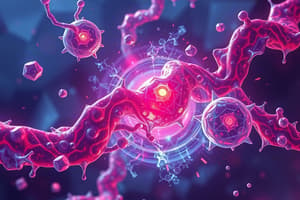Podcast
Questions and Answers
What is the primary role of enzymes in chemical reactions?
What is the primary role of enzymes in chemical reactions?
- To catalyze (speed up) reactions (correct)
- To get consumed in the reaction
- To slow down reactions
- To change the reaction products
Enzymes can change shape and still function properly.
Enzymes can change shape and still function properly.
False (B)
What happens to an enzyme at its optimum temperature?
What happens to an enzyme at its optimum temperature?
The reaction works as fast as possible.
An enzyme's ability to catalyze a reaction is dependent on its ______.
An enzyme's ability to catalyze a reaction is dependent on its ______.
Match the following terms with their definitions:
Match the following terms with their definitions:
Flashcards
Enzyme
Enzyme
A protein that speeds up chemical reactions in living organisms.
Active site
Active site
The part of an enzyme where the reaction happens.
Lock and Key Theory
Lock and Key Theory
The idea that enzymes and substrates fit together like a lock and key.
Denaturation
Denaturation
Signup and view all the flashcards
Optimum Temperature
Optimum Temperature
Signup and view all the flashcards
Study Notes
Enzymes
- Enzymes are large proteins that catalyse reactions, speeding them up.
- Enzymes remain unchanged after a reaction.
- The lock and key theory explains how enzymes work simply.
Lock and Key Theory
- Enzymes have a specific active site shape.
- The substrate (reactant) fits into the active site like a key in a lock.
- The enzyme can only catalyse specific reactions due to active site shape.
- The enzyme breaks down or joins molecules at the active site.
- The products leave the active site; the active site then accepts another substrate.
Enzyme Denaturation
- Extreme pH or high temperatures can change the enzyme's active site shape.
- This shape change prevents the substrate from fitting into the active site.
- Denaturation stops the enzyme from working.
- The substrate no longer fits in the active site, halting the reaction.
- A denatured enzyme can no longer catalyse the reaction.
Effect of Temperature on Enzymes
- Reaction rate increases as temperature increases.
- Molecules move faster and collide more frequently.
- Optimum temperature is where the reaction rate is fastest.
- When temperature reaches beyond optimum levels, reaction rate reduces.
- Extremely high temperatures disrupt enzyme shape, causing denaturation.
Studying That Suits You
Use AI to generate personalized quizzes and flashcards to suit your learning preferences.



